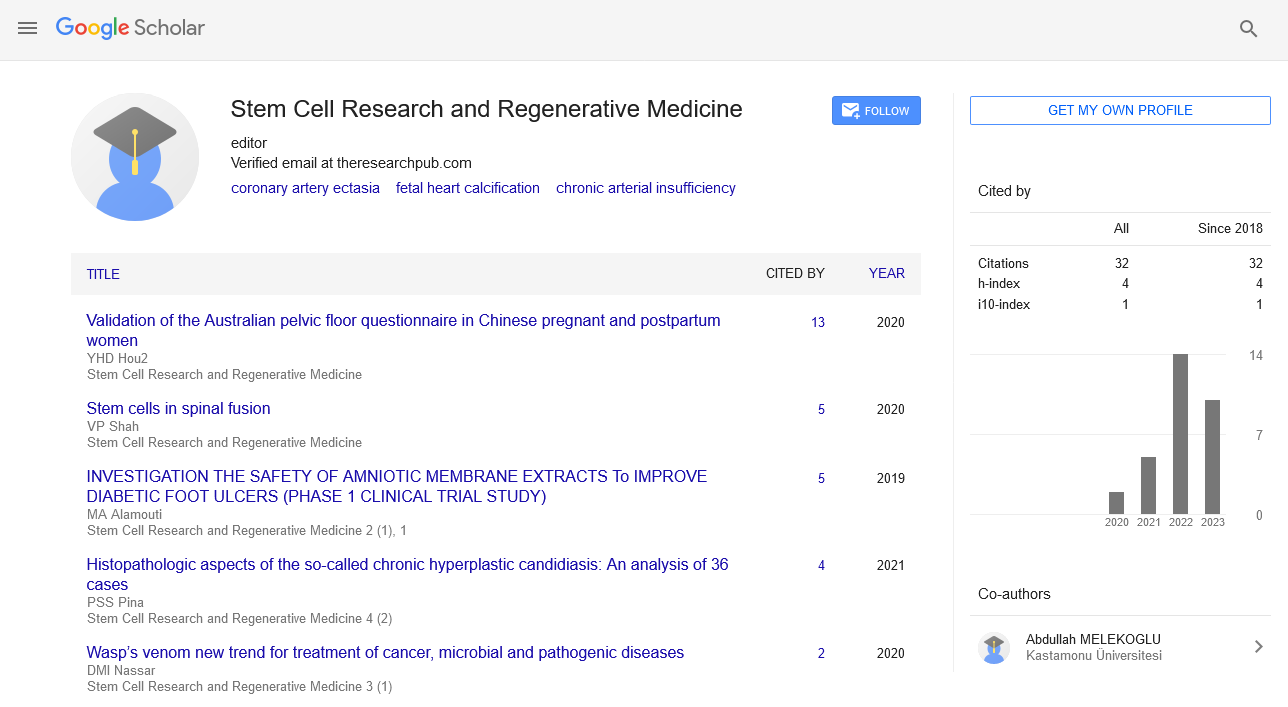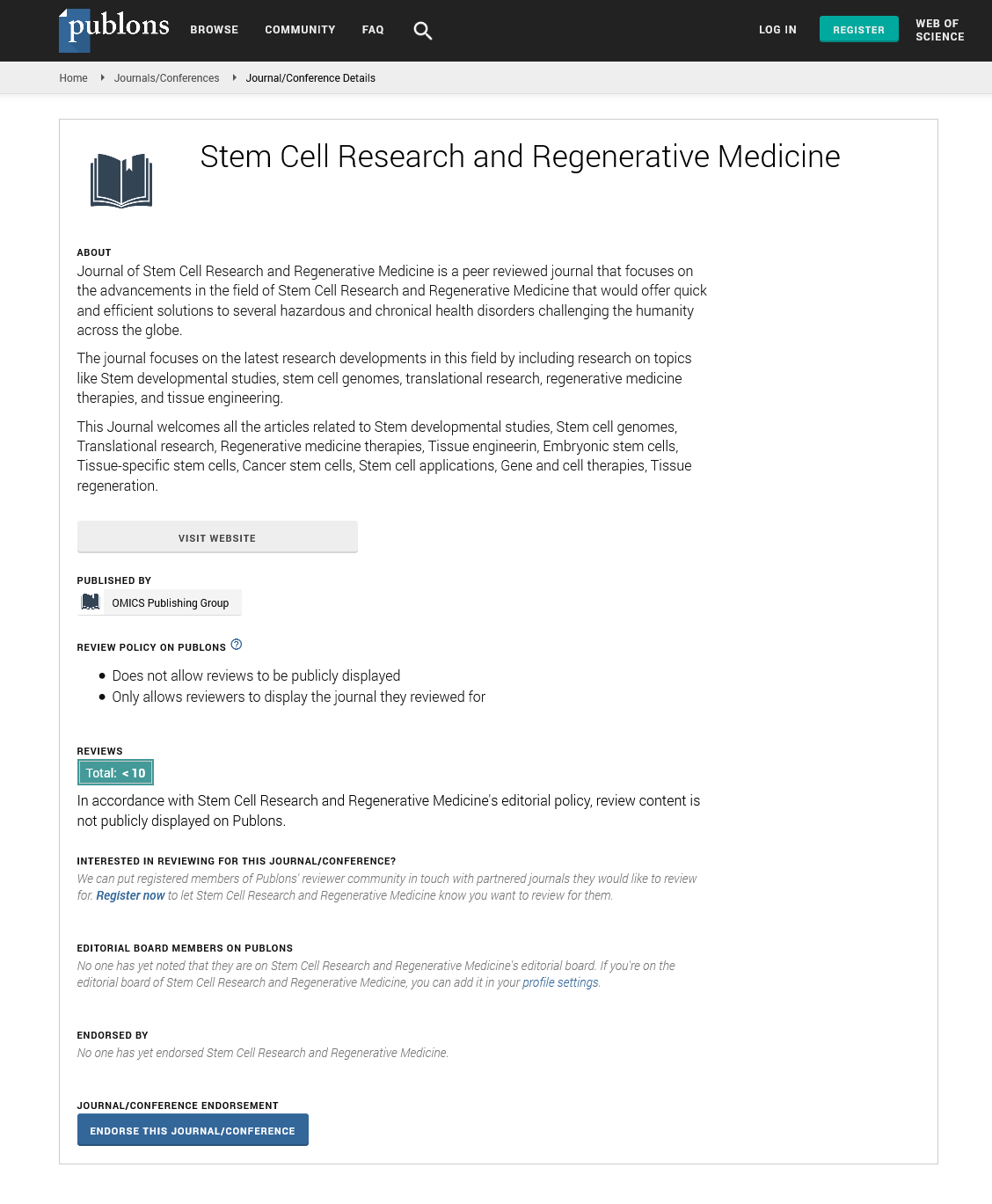Perspective - Stem Cell Research and Regenerative Medicine (2024) Volume 7, Issue 5
The Ethical Landscape of Regenerative Medicine
- Corresponding Author:
- Lee Eun
Department of Bio-Medical Engineering,
New Jersey Institute of Technology,
Newark,
New Jersey,
USA
E-mail: leeeun@gmail.com
Received: 01-Oct-2024, Manuscript No. SRRM-24-149855; Editor assigned: 03-Oct-2024, Pre QC No. SRRM-24-149855 (PQ); Reviewed: 17-Oct-2024, QC No. SRRM-24- 149855; Revised: 21-Oct-2024, Manuscript No. SRRM-24-149855 (R); Published: 31-Oct-2024, DOI: 10.37532/SRRM.2024.7(5).263-264
Introduction
Regenerative medicine represents a groundbreaking approach to healthcare, focusing on repairing, replacing, or regenerating damaged tissues and organs. Utilizing techniques such as stem cell therapy, tissue engineering, and gene editing, regenerative medicine holds the promise of treating conditions that were previously deemed incurable. However, the rapid advancement of these technologies raises complex ethical questions and challenges. This article explores the ethical landscape of regenerative medicine, highlighting key considerations, dilemmas, and the need for responsible innovation in this evolving field.
Description
Key ethical considerations in regenerative medicine
Informed consent: Informed consent is a fundamental ethical principle in medical research and treatment. In regenerative medicine, the complexity of the therapies and the potential risks involved necessitate thorough and clear communication with patients. It is crucial that patients fully understand the experimental nature of many regenerative treatments, the possible outcomes, and any associated risks before consenting to participate in clinical trials or undergo therapy. The challenge lies in ensuring that information is conveyed in an accessible manner, allowing patients to make truly informed decisions about their care.
Equity and access: The promise of regenerative medicine raises concerns about equity and access to advanced therapies. As these treatments often come with high costs, there is a risk that only a select few will benefit, exacerbating existing health disparities. Ensuring that regenerative medicine is accessible to all, regardless of socioeconomic status, is an ethical imperative. Policymakers and healthcare providers must work together to address these disparities and promote equitable access to innovative therapies.
Source of stem cells: The source of stem cells used in regenerative medicine is a contentious ethical issue. While embryonic stem cells have significant potential for research and therapy, their use raises moral concerns related to the destruction of human embryos. In contrast, adult stem cells and induced Pluripotent Stem Cells (iPSCs) present alternatives, but ethical considerations surrounding their use and sourcing remain. Clear guidelines and ethical frameworks are necessary to navigate these complex moral landscapes, balancing scientific advancement with respect for human dignity.
Clinical trials and patient safety: As regenerative medicine is a relatively new field, many therapies are still in experimental stages. This raises ethical questions about the conduct of clinical trials and the safety of patients participating in them. Researchers must adhere to ethical guidelines that prioritize patient welfare, ensuring that potential risks are minimized and that patients are closely monitored throughout the trial process. Transparency in reporting trial results, including adverse events, is essential for maintaining public trust in the field.
Germline editing and gene therapy: The advent of gene editing technologies, such as CRISPRCas9, has opened new possibilities in regenerative medicine, particularly for inherited genetic disorders. However, germline editing, which alters the genetic material in eggs, sperm, or embryos, raises profound ethical concerns. The potential for unintended consequences, the long-term effects on future generations, and the moral implications of “designer babies” must be carefully considered. The ethical landscape surrounding germline editing calls for robust regulatory frameworks and public discourse to guide responsible use.
Commercialization and profit motives: The commercialization of regenerative medicine poses ethical challenges related to profit motives and the potential for exploitation. As companies seek to capitalize on advancements in this field, there is a risk that financial interests may overshadow patient welfare. Ensuring that research and treatments prioritize patient outcomes over profits is essential for maintaining ethical standards in regenerative medicine. Transparency in pricing, marketing practices, and the sharing of clinical data is crucial to foster trust and accountability.
The role of ethical guidelines and regulatory frameworks
Establishing ethical guidelines and regulatory frameworks is essential for guiding the development and implementation of regenerative medicine. These frameworks should address key ethical considerations, including informed consent, patient safety, equitable access, and the responsible use of emerging technologies.
International collaboration and standards
Given the global nature of regenerative medicine research and applications, international collaboration is vital. Developing harmonized ethical standards and regulatory guidelines across countries can promote responsible practices and ensure that patients worldwide benefit from advancements in regenerative therapies. Organizations such as the World Health Organization (WHO) and the International Society for Stem Cell Research (ISSCR) play a crucial role in fostering collaboration and establishing best practices.
Public engagement and discourse
Engaging the public in discussions about the ethical implications of regenerative medicine is essential for fostering understanding and trust. Public forums, educational initiatives, and transparent communication can help demystify complex scientific concepts and encourage informed public discourse. Involving diverse stakeholders, including patients, ethicists, scientists, and policymakers, can lead to more comprehensive ethical frameworks that reflect societal values and concerns.
Continuous ethical review
As regenerative medicine continues to evolve, ongoing ethical review is necessary to address emerging challenges and concerns. Regulatory bodies should establish mechanisms for continuous evaluation of research practices and treatment protocols, ensuring that ethical standards keep pace with scientific advancements. Regular reassessment of ethical guidelines can help safeguard patient welfare and public trust in regenerative medicine.
Conclusion
The ethical landscape of regenerative medicine is complex and multifaceted, encompassing a range of considerations that must be navigated responsibly. While the potential of regenerative therapies to transform healthcare is immense, ethical challenges related to informed consent, equity, patient safety, and the commercialization of science must be addressed. Establishing robust ethical guidelines and regulatory frameworks, engaging the public in discourse, and fostering international collaboration are essential steps toward ensuring that regenerative medicine advances in a manner that respects human dignity and promotes the well-being of patients.
As we move forward in this promising field, a commitment to ethical principles will be crucial in realizing the full potential of regenerative medicine while safeguarding the rights and welfare of individuals. Balancing innovation with ethical responsibility will ultimately shape the future of regenerative medicine and its role in improving human health.


